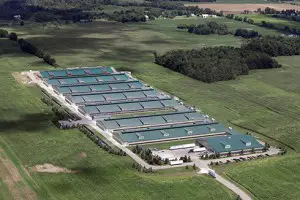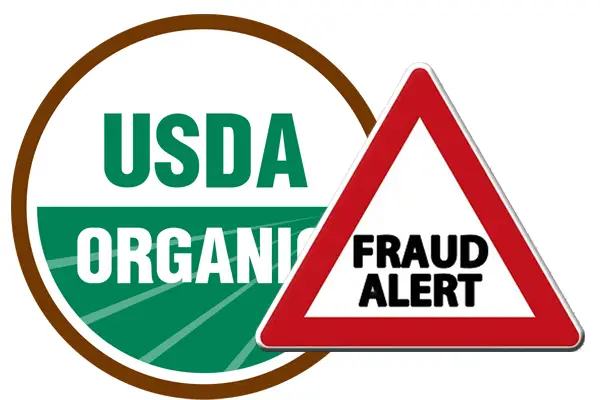The Cornucopia Institute, a public interest organization and watchdog group for organic food and agriculture, has officially released a call-to-action report about fraudulent activity at the U.S. Department of Agriculture (USDA) and its organic standards program.
The presented materials call into serious question their commitment to protecting the integrity of the organic label.
Being questioned by the Institute is Miles McEvoy, the new head of the National Organic Program (NOP). The Cornucopia Institute, which once supported McEvoy in 2009, has now stated that his management has become a “disappointment” and is demanding change.
The organic food label was federally defined by the USDA’s Organic Foods Production Act of 1990 (OFPA). The act defined the standard for the quality of organic products – their production, handling and processing. Products that meet the standard can be legally labeled “USDA Certified Organic.” The NOP enforces current regulations for producing organic food. The program, however, does not “address food safety or nutrition,” according to their website.
And in recent years, some rather interesting information started coming out about the department not following the standard’s laws and guidelines.
Ignoring the big corporations’ lawbreaking
Even though McEvoy has said that the NOP is beginning the “age of enforcement” he has completely ignored any wrong-doing by bigger companies (they received “favorable treatment”) and only targeted smaller operations, according to Institute.
The USDA did not acknowledge who the lawbreakers are, even those who were fined, leaving the public in the dark.
Recent Legal Actions against the USDA
The Cornucopia Institute also recently sued the USDA for “watering down the organic standards.” In December 2014, they filed 14 legal complaints for violating organic standards on big factory farms. The cows and chickens who were supposed to be pasture-raised were found in feedlots and cramped barns instead. The Institute took aerial photos as evidence, yet McEvoy dismissed them saying they were “taken at a point in time” and that they do not “indicate one thing or another.” He refused to open an investigation.
When the USDA does investigate a farm, they send their own certifier, the same person who certified the farm in the first place, which may lead to conflict of interest.

Photos taken by Cornucopia showed potential factory farm-like conditions at organic operations. It was reportedly ignored by the USDA. Click the picture to view the report.
Past Legal Actions Resulted in Slow Investigation with No Results
In 2008, the Cornucopia Institute filed a complaint against the large Shamrock Dairy Farm near Phoenix, Arizona for “livestock management violations.” After three years, the USDA found the farm in violation of the law, but the farm appealed, and after six years there is no end in sight. The farm is still producing dairy with the USDA organic label without the public’s knowledge of their violations.
The USDA seems to always refuse or take a long time to investigate. In the case of organic grain fraud produced by Jirah Mills in Quebec, Canada, the Quebec government promptly prohibited the company from selling organic products in their province. The USDA’s investigation, however, remains open and the company sells the same fraudulent grain to the U.S.
Lack of Transparency
The NOP has been keeping secret the following pieces of information: ongoing investigations, farms that broke the law, many notes of its board’s meetings, and names of the scientists who perform technical reviews.
McEvoy’s Influence on NOSB
The National Organic Standard Board (NOSB) was created in 1990 as a part of OFPA. The mission of its 15 members is to make sure the monetary pressure from agricultural lobbyists does not corrupt the organic standard. McEvoy removed the NOSB subcommittee that was in charge of board’s meetings and “ethical oversight” against the wishes of the other board members, according to Cornucopia. He also started to run the meetings himself to remove any obstacles to pushing his own agenda.
Other issues with McEvoy’s management
In the past, his administration allowed some synthetic materials for use in organics, which had to be removed from the approved list every five years unless two-third of the board members voted for them to remain on the list. McEvoy flip-flopped the procedure. Now the synthetic materials stay on the list indefinitely unless two-third of the members vote for their removal.
In 2010, the NOSB recommended the complete banning of nanomaterials for use in organic food and its packaging. The scientific studies showed a lack of evidence of their safety. McEvoy, however, decided against the prohibition of human-engineered nanoparticles, at a time when the USDA was investing millions in research on nanotechnology in food.
The organic standard also calls for the food to grow in fertile soil with good nutritional content. But the NOP is permitting large factory-farms to grow plants using artificial lighting and synthetic additives, which does not meet the requirements to be called “certified organic” – but this food does end up being labeled organic after all.
Signing the Complaint
While buying USDA certified organic food is still the best way to avoid harmful synthetic pesticides, additives, preservatives, and genetically modified ingredients, it is important to realize that organic standards are under attack as big corporations move in on this highly profitable industry.
With organic standards in danger and the likelihood of fraud rampant, it’s important to take action by supporting smaller companies that do it the right way.
In addition Cornucopia asks anyone, who after reading through their report and agreed that McEvoy needs to be replaced and corruption stopped, to sign their proxy, which the organization will then deliver to USDA Secretary Tom Vilsack (who unfortunately has strong ties to the GMO industry himself).
Thanks for installing the Bottom of every post plugin by Corey Salzano. Contact me if you need custom WordPress plugins or website design.






